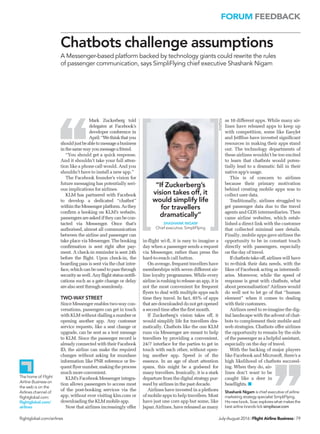Article: Chatbots challenge assumptions
- 1. flightglobal.com/airlines July-August 2016 | Flight Airline Business | 79 FORUM FEEDBACK Mark Zuckerberg told delegates at Facebook’s developer conference in April:“Wethinkthatyou shouldjustbeabletomessageabusiness inthesamewayyoumessageafriend. “You should get a quick response. And it shouldn’t take your full atten- tion like a phone call would. And you shouldn’t have to install a new app.” The Facebook founder’s vision for future messaging has potentially seri- ous implications for airlines. KLM has partnered with Facebook to develop a dedicated “chatbot” withintheMessengerplatform.Asthey confirm a booking on KLM’s website, passengersareaskediftheycanbecon- tacted via Messenger. Once that’s authorised, almost all communication between the airline and passenger can take place via Messenger. The booking confirmation is sent right after pay- ment. A check-in reminder is sent 24h before the flight. Upon check-in, the boarding pass is sent via the chat inter- face,whichcanbeusedtopassthrough securityaswell.Anyflightstatusnotifi- cations such as a gate change or delay arealsosentthroughseamlessly. TWO-WAY STREET Since Messenger enables two-way con- versations, passengers can get in touch with KLM without dialling a number or opening another app. Any customer service requests, like a seat change or upgrade, can be sent as a text message to KLM. Since the passenger record is already connected with their Facebook ID, the airline can make the required changes without asking for mundane information like PNR reference or fre- quent flyer number, making the process much more convenient. KLM’s Facebook Messenger integra- tion allows passengers to access most of the post-booking services via the app, without ever visiting klm.com or downloading the KLM mobile app. Now that airlines increasingly offer in-flight wi-fi, it is easy to imagine a day when a passenger sends a request via Messenger, rather than press the hard-to-reach call button. On average, frequent travellers have memberships with seven different air- line loyalty programmes. While every airline is rushing to release an app, it is not the most convenient for frequent flyers to deal with multiple apps each time they travel. In fact, 85% of apps that are downloaded do not get opened a second time after the first month. If Zuckerberg’s vision takes off, it would simplify life for travellers dra- matically. Chatbots like the one KLM runs via Messenger are meant to help travellers by providing a convenient, 24/7 interface for the parties to get in touch with each other, without open- ing another app. Speed is of the essence. In an age of short attention spans, this might be a godsend for many travellers. Ironically, it is a stark departure from the digital strategy pur- sued by airlines in the past decade. Airlines have invested in a plethora of mobile apps to help travellers. Most have just one core app but some, like Japan Airlines, have released as many as 10 different apps. While many air- lines have released apps to keep up with competition, some like EasyJet and JetBlue have invested significant resources in making their apps stand out. The technology departments of these airlines wouldn’t be too excited to learn that chatbots would poten- tially lead to a dramatic fall in their native app’s usage. This is of concern to airlines because their primary motivation behind creating mobile apps was to collect user data. Traditionally, airlines struggled to get passenger data due to the travel agents and GDS intermediaries. Then came airline websites, which estab- lished a direct link with the customer that collected minimal user details. Finally, mobile apps gave airlines the opportunity to be in constant touch directly with passengers, especially on the day of travel. If chatbots take off, airlines will have to re-think their data needs, with the likes of Facebook acting as intermedi- aries. Moreover, while the speed of response is great with chatbots, what about personalisation? Airlines would do well not to let go of that “human element” when it comes to dealing with their customers. Airlines need to re-imagine the dig- ital landscape with the advent of chat- bots to complement their mobile and web strategies. Chatbots offer airlines the opportunity to remain by the side of the passenger as a helpful assistant, especially on the day of travel. With the backing of major players like Facebook and Microsoft, there’s a high likelihood of chatbots succeed- ing. When they do, air- lines don’t want to be caught like a deer in headlights. ■ SimpliFlying Shashank Nigam is chief executive of airline marketing strategy specialist SimpliFlying. His new book, Soar, explores what makes the best airline brands tick simplisoar.com Chatbots challenge assumptions A Messenger-based platform backed by technology giants could rewrite the rules of passenger communication, says SimpliFlying chief executive Shashank Nigam “If Zuckerberg’s vision takes off, it would simplify life for travellers dramatically” SHASHANK NIGAM Chief executive, SimpliFlying The home of Flight Airline Business on the web is on the Airlines channel of flightglobal.com: flightglobal.com/ airlines

